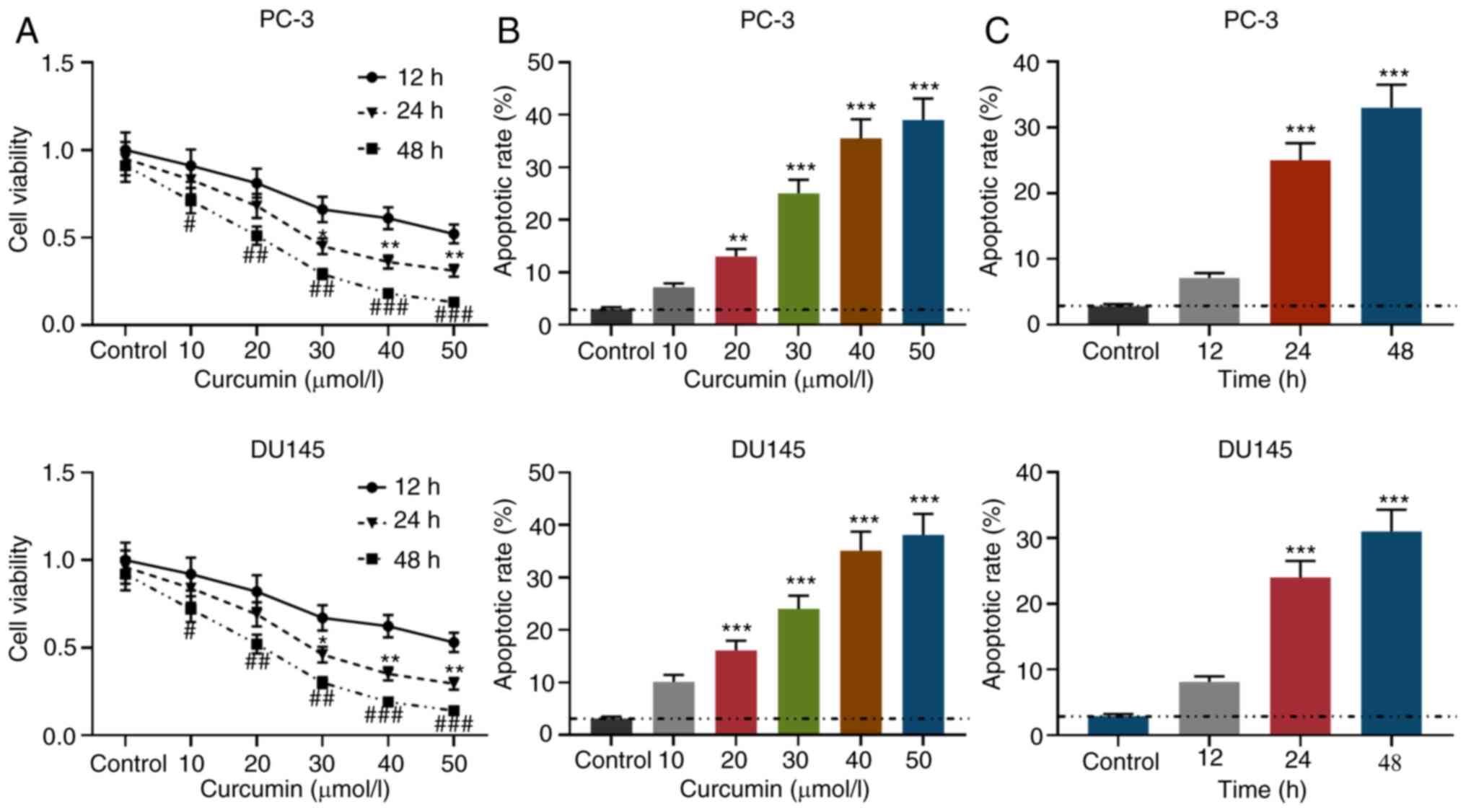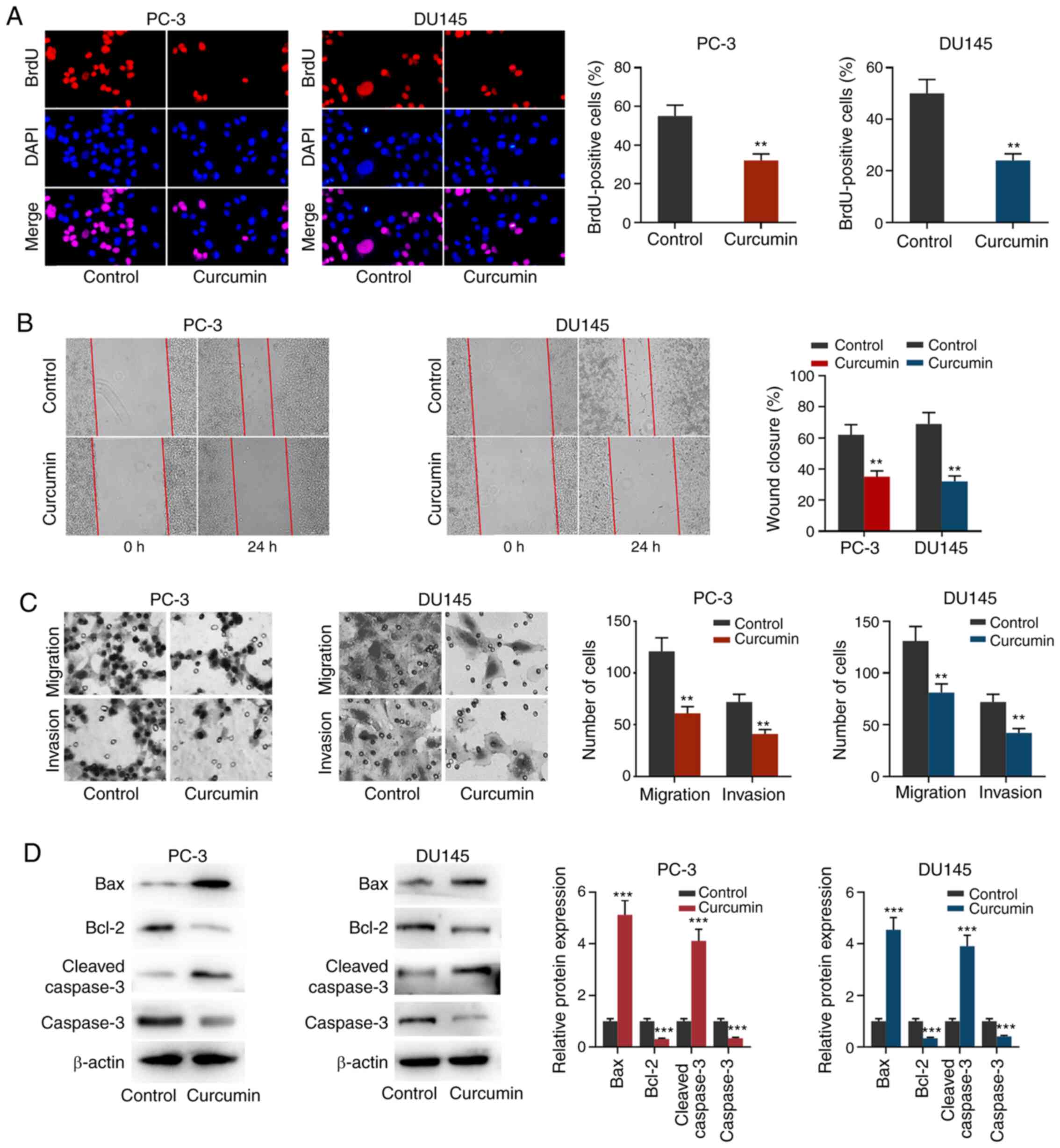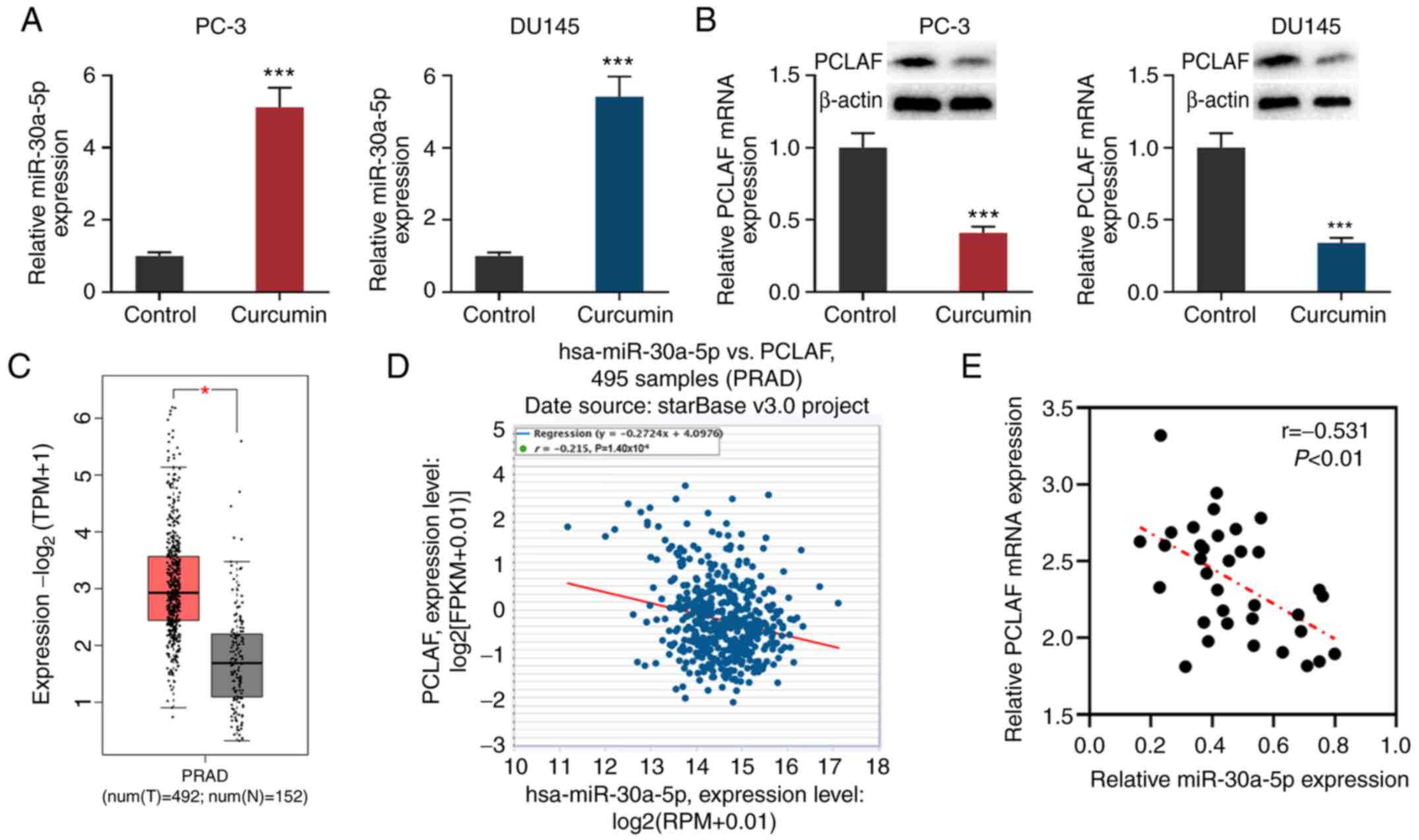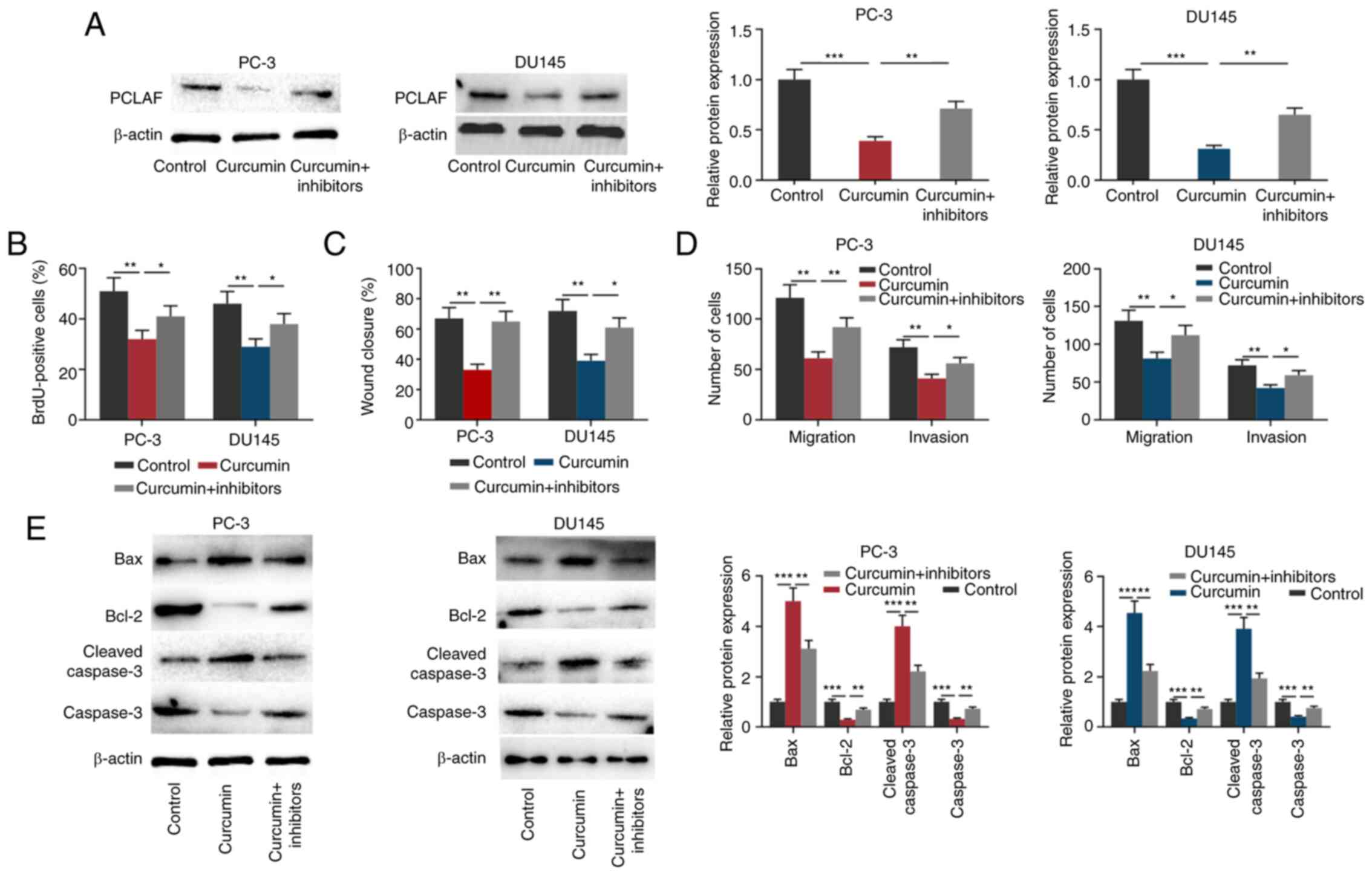|
1
|
Guo Z, He C, Yang F, Qin L, Lu X and Wu J:
Long non-coding RNA-NEAT1, a sponge for miR-98-5p, promotes
expression of oncogene HMGA2 in prostate cancer. Biosci Rep: Sep
24, 2019 (Epub ahead of print). doi: 10.1042/BSR20190635.
|
|
2
|
Song Z, Zhuo Z, Ma Z, Hou C, Chen G and Xu
G: Hsa_Circ_0001206 is downregulated and inhibits cell
proliferation, migration and invasion in prostate cancer. Artif
Cells Nanomed Biotechnol. 47:2449–2464. 2019.PubMed/NCBI View Article : Google Scholar
|
|
3
|
Dart DA, Koushyar S, Lanning BE and Jiang
W: MiR-221 is specifically elevated in PC3 cells and its deletion
reduces adhesion, motility and growth. Anticancer Res.
39:5311–5327. 2019.PubMed/NCBI View Article : Google Scholar
|
|
4
|
Li H, Yue L, Xu H, Li N, Li J, Zhang Z and
Zhao RC: Curcumin suppresses osteogenesis by inducing miR-126a-3p
and subsequently suppressing the WNT/LRP6 pathway. Aging (Albany
NY). 11:6983–6998. 2019.PubMed/NCBI View Article : Google Scholar
|
|
5
|
Mou S, Zhou Z, He Y, Liu F and Gong L:
Curcumin inhibits cell proliferation and promotes apoptosis of
laryngeal cancer cells through Bcl-2 and PI3K/Akt, and by
upregulating miR-15a. Oncol Lett. 14:4937–4942. 2017.PubMed/NCBI View Article : Google Scholar
|
|
6
|
Zhan JW, Jiao DM, Wang Y, Song J, Wu JH,
Wu LJ, Chen QY and Ma SL: Integrated microRNA and gene expression
profiling reveals the crucial miRNAs in curcumin anti-lung cancer
cell invasion. Thorac Cancer. 8:461–470. 2017.PubMed/NCBI View Article : Google Scholar
|
|
7
|
Sun C, Zhang S, Liu C and Liu X: Curcumin
promoted miR-34a expression and suppressed proliferation of gastric
cancer cells. Cancer Biother Radiopharm. 34:634–641.
2019.PubMed/NCBI View Article : Google Scholar
|
|
8
|
Qian C, Wang B, Zou Y, Zhang Y, Hu X, Sun
W, Xiao H, Liu H and Shi L: MicroRNA 145 enhances chemosensitivity
of glioblastoma stem cells to demethoxycurcumin. Cancer Manag Res.
11:6829–6840. 2019.PubMed/NCBI View Article : Google Scholar
|
|
9
|
Sak K: Radiosensitizing potential of
curcumin in different cancer models. Nutr Cancer. 72:1276–1289.
2020.PubMed/NCBI View Article : Google Scholar
|
|
10
|
Xu R, Li H, Wu S, Qu J, Yuan H, Zhou Y and
Lu Q: MicroRNA-1246 regulates the radio-sensitizing effect of
curcumin in bladder cancer cells via activating P53. Int Urol
Nephrol. 51:1771–1779. 2019.PubMed/NCBI View Article : Google Scholar
|
|
11
|
Dou H, Shen R, Tao J, Huang L, Shi H, Chen
H, Wang Y and Wang T: Curcumin suppresses the colon cancer
proliferation by inhibiting Wnt/β-catenin pathways via miR-130a.
Front Pharmacol. 8(877)2017.PubMed/NCBI View Article : Google Scholar
|
|
12
|
Liu J, Li M, Wang Y and Luo J: Curcumin
sensitizes prostate cancer cells to radiation partly via epigenetic
activation of miR-143 and miR-143 mediated autophagy inhibition. J
Drug Target. 25:645–652. 2017.PubMed/NCBI View Article : Google Scholar
|
|
13
|
Zhao W, Zhou X, Qi G and Guo Y: Curcumin
suppressed the prostate cancer by inhibiting JNK pathways via
epigenetic regulation. J Biochem Mol Toxicol.
32(e22049)2018.PubMed/NCBI View Article : Google Scholar
|
|
14
|
Cao H, Yu H, Feng Y, Chen L and Liang F:
Curcumin inhibits prostate cancer by targeting PGK1 in the
FOXD3/miR-143 axis. Cancer Chemother Pharmacol. 79:985–994.
2017.PubMed/NCBI View Article : Google Scholar
|
|
15
|
Liu T, Chi H, Chen J, Chen C, Huang Y, Xi
H, Xue J and Si Y: Curcumin suppresses proliferation and in vitro
invasion of human prostate cancer stem cells by ceRNA effect of
miR-145 and lncRNA-ROR. Gene. 631:29–38. 2017.PubMed/NCBI View Article : Google Scholar
|
|
16
|
Livak KJ and Schmittgen TD: Analysis of
relative gene expression data using real-time quantitative PCR and
the 2(-Delta Delta C(T)) method. Methods. 25:402–408.
2001.PubMed/NCBI View Article : Google Scholar
|
|
17
|
Wu X, Jia R, Wang M, Chen S, Liu M, Zhu D,
Zhao X, Yang Q, Wu Y, Yin Z, et al: Downregulation of
microRNA-30a-5p contributes to the replication of duck enteritis
virus by regulating Beclin-1-mediated autophagy. Virol J.
16(144)2019.PubMed/NCBI View Article : Google Scholar
|
|
18
|
Li J, Zhao LM, Zhang C, Li M, Gao B, Hu
XH, Cao J and Wang GY: The lncRNA FEZF1-AS1 promotes the
progression of colorectal cancer through regulating OTX1 and
targeting miR-30a-5p. Oncol Res. 28:51–63. 2020.PubMed/NCBI View Article : Google Scholar
|
|
19
|
Noori J, Haghjooy Javanmard S and Sharifi
M: The role of microRNA-30a and downstream snail1 on the growth and
metastasis of melanoma tumor. Iran J Basic Med Sci. 22:534–540.
2019.PubMed/NCBI View Article : Google Scholar
|
|
20
|
Zhao H, Lai X, Zhang W, Zhu H, Zhang S, Wu
W, Wang S, Tang M, Deng Z and Tan J: MiR-30a-5p frequently
downregulated in prostate cancer inhibits cell proliferation via
targeting PCLAF. Artif Cells Nanomed Biotechnol. 47:278–289.
2019.PubMed/NCBI View Article : Google Scholar
|
|
21
|
Yang J, Wang C, Zhang Z, Chen X, Jia Y,
Wang B and Kong T: Curcumin inhibits the survival and metastasis of
prostate cancer cells via the Notch-1 signaling pathway. APMIS.
125:134–140. 2017.PubMed/NCBI View Article : Google Scholar
|
|
22
|
Sha J, Li J, Wang W, Pan L, Cheng J, Li L,
Zhao H and Lin W: Curcumin induces G0/G1 arrest and apoptosis in
hormone independent prostate cancer DU-145 cells by down regulating
Notch signaling. Biomed Pharmacother. 84:177–184. 2016.PubMed/NCBI View Article : Google Scholar
|
|
23
|
Du Y, Long Q, Zhang L, Shi Y, Liu X, Li X,
Guan B, Tian Y, Wang X, Li L, et al: Curcumin inhibits
cancer-associated fibroblast-driven prostate cancer invasion
through MAOA/mTOR/HIF-1α signaling. Int J Oncol. 47:2064–2072.
2015.PubMed/NCBI View Article : Google Scholar
|
|
24
|
Sundram V, Chauhan SC, Ebeling M and Jaggi
M: Curcumin attenuates β-catenin signaling in prostate cancer cells
through activation of protein kinase D1. PLoS One.
7(e35368)2012.PubMed/NCBI View Article : Google Scholar
|
|
25
|
Wei Q, Tu Y, Zuo L, Zhao J, Chang Z, Zou Y
and Qiu J: MiR-345-3p attenuates apoptosis and inflammation caused
by oxidized low-density lipoprotein by targeting TRAF6 via
TAK1/p38/NF-kB signaling in endothelial cells. Life Sci.
241(117142)2020.PubMed/NCBI View Article : Google Scholar
|
|
26
|
Wu Z, Chen D, Wang K, Cao C and Xu X: Long
non-coding RNA SNHG12 functions as a competing endogenous RNA to
regulate MDM4 expression by sponging miR-129-5p in clear cell renal
cell carcinoma. Front Oncol. 9(1260)2019.PubMed/NCBI View Article : Google Scholar
|
|
27
|
Ye J, Lei J, Fang Q, Shen Y, Xia W, Hu X,
Xu Q, Yuan H, Huang J and Ni C: miR-4666-3p and miR-329
synergistically suppress the stemness of colorectal cancer cells
via targeting TGF-β/Smad pathway. Front Oncol.
9(1251)2019.PubMed/NCBI View Article : Google Scholar
|
|
28
|
Zhang H, Li Y, Tan Y, Liu Q, Jiang S, Liu
D, Chen Q and Zhang S: MiR-9-5p inhibits glioblastoma cells
proliferation through directly targeting FOXP2 (Forkhead Box P2).
Front Oncol. 9(1176)2019.PubMed/NCBI View Article : Google Scholar
|
|
29
|
Rui X, Gu TT, Pan HF, Shao SL and Shao HX:
MicroRNA-381 suppresses proliferation and invasion of prostate
cancer cells through downregulation of the androgen receptor. Oncol
Lett. 18:2066–2072. 2019.PubMed/NCBI View Article : Google Scholar
|
|
30
|
Jiao DM, Yan L, Wang LS, Hu HZ, Tang XL,
Chen J, Wang J, Li Y and Chen QY: Exploration of inhibitory
mechanisms of curcumin in lung cancer metastasis using a miRNA-
transcription factor-target gene network. PLoS One.
12(e0172470)2017.PubMed/NCBI View Article : Google Scholar
|
|
31
|
Yin S, Du W, Wang F, Han B, Cui Y, Yang D,
Chen H, Liu D, Liu X, Zhai X, et al: MicroRNA-326 sensitizes human
glioblastoma cells to curcumin via the SHH/GLI1 signaling pathway.
Cancer Biol Ther. 19:260–270. 2018.PubMed/NCBI View Article : Google Scholar
|
|
32
|
Zhu X and Zhu R: Curcumin suppresses the
progression of laryngeal squamous cell carcinoma through the
upregulation of miR-145 and inhibition of the PI3K/Akt/mTOR
pathway. OncoTargets Ther. 11:3521–3531. 2018.PubMed/NCBI View Article : Google Scholar
|
|
33
|
Feng S, Wang Y, Zhang R, Yang G, Liang Z,
Wang Z and Zhang G: Curcumin exerts its antitumor activity through
regulation of miR-7/Skp2/p21 in nasopharyngeal carcinoma cells.
OncoTargets Ther. 10:2377–2388. 2017.PubMed/NCBI View Article : Google Scholar
|
|
34
|
Zhang L, Zhang XW, Liu CH, Lu K, Huang YQ,
Wang YD, Xing L, Zhang LJ, Liu N, Jiang H, et al: miRNA-30a
functions as a tumor suppressor by downregulating cyclin E2
expression in castration-resistant prostate cancer. Mol Med Rep.
14:2077–2084. 2016.PubMed/NCBI View Article : Google Scholar
|
|
35
|
Zhang J, Shen C, Wang L, Ma Q, Xia P, Qi
M, Yang M and Han B: Metformin inhibits epithelial-mesenchymal
transition in prostate cancer cells: Involvement of the tumor
suppressor miR30a and its target gene SOX4. Biochem Biophys Res
Commun. 452:746–752. 2014.PubMed/NCBI View Article : Google Scholar
|
|
36
|
Jiang LH, Zhang HD and Tang JH: MiR-30a: A
novel biomarker and potential therapeutic target for cancer. J
Oncol. 2018(5167829)2018.PubMed/NCBI View Article : Google Scholar
|
|
37
|
Li L, Kang L, Zhao W, Feng Y, Liu W, Wang
T, Mai H, Huang J, Chen S, Liang Y, et al: miR-30a-5p suppresses
breast tumor growth and metastasis through inhibition of
LDHA-mediated Warburg effect. Cancer Lett. 400:89–98.
2017.PubMed/NCBI View Article : Google Scholar
|
|
38
|
Zhu J, Zeng Y, Li W, Qin H, Lei Z, Shen D,
Gu D, Huang JA and Liu Z: CD73/NT5E is a target of miR-30a-5p and
plays an important role in the pathogenesis of non-small cell lung
cancer. Mol Cancer. 16(34)2017.PubMed/NCBI View Article : Google Scholar
|
|
39
|
Zhang T, Guo J, Gu J, Chen K, Wang Z, Li
H, Wang G and Wang J: KIAA0101 is a novel transcriptional target of
FoxM1 and is involved in the regulation of hepatocellular carcinoma
microvascular invasion by regulating epithelial-mesenchymal
transition. J Cancer. 10:3501–3516. 2019.PubMed/NCBI View Article : Google Scholar
|
|
40
|
Abdelgawad IA, Radwan NH and Hassanein HR:
KIAA0101 mRNA expression in the peripheral blood of hepatocellular
carcinoma patients: Association with some clinicopathological
features. Clin Biochem. 49:787–791. 2016.PubMed/NCBI View Article : Google Scholar
|
|
41
|
Lv W, Su B, Li Y, Geng C and Chen N:
KIAA0101 inhibition suppresses cell proliferation and cell cycle
progression by promoting the interaction between p53 and Sp1 in
breast cancer. Biochem Biophys Res Commun. 503:600–606.
2018.PubMed/NCBI View Article : Google Scholar
|
|
42
|
Chen H, Xia B, Liu T, Lin M and Lou G:
KIAA0101, a target gene of miR-429, enhances migration and
chemoresistance of epithelial ovarian cancer cells. Cancer Cell
Int. 16(74)2016.PubMed/NCBI View Article : Google Scholar
|


















